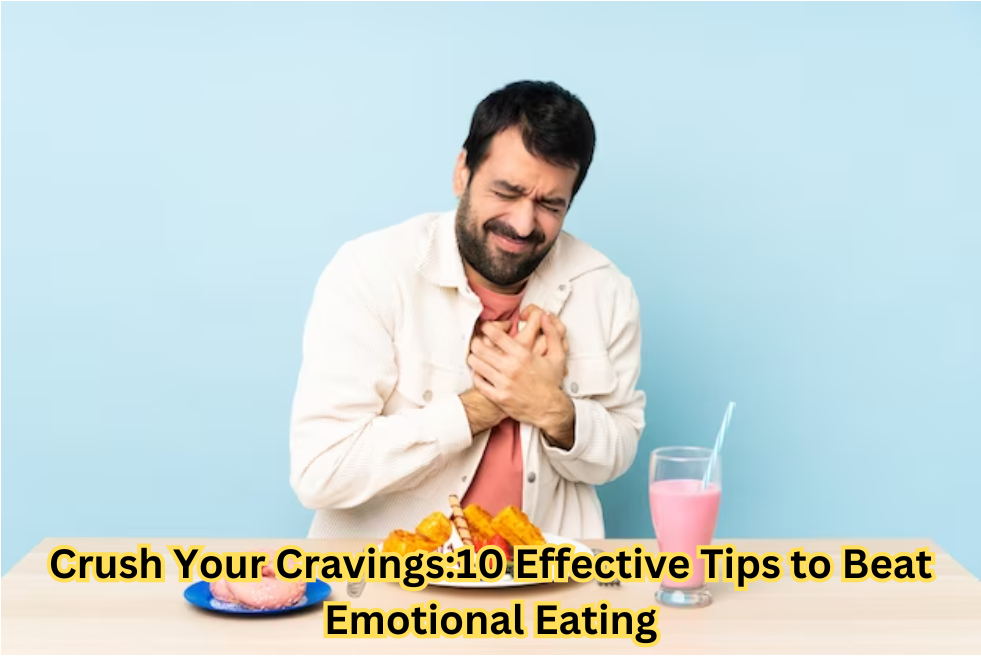Beat Emotional Eating Do you find yourself grabbing food if you’re anxious or upset? Any diet program, no matter how well-intentioned, can be derailed by emotional eating. Yet, have no dread! If you want to overcome emotional eating and regain control over your desires, this detailed article will show you ten practical ways.

Exploring the Concept of Emotional Eating
Beat Emotional Eating: An understanding of emotional eating is necessary before moving on to the suggestions. Overeating or bingeing is a common result of this behavior, characterized by using food as a means of emotional regulation. Various emotions, including joy, boredom, stress, or grief, can set off these desires.
Identify What Sets You Off
Beat Emotional Eating To overcome emotional eating, you must first know what sets you off. To keep note of incidents of emotional eating, keep a diary. Note how you felt, what you ate, and what happened at these times. With this exercise, you may learn to see trends and identify the triggers for your desires.
Praying While You Eat
Beat Emotional Eating To overcome emotional triggers, practice mindful eating. Take a moment to check how hungry you are before you eat. Pay close attention as you eat, chew your food thoroughly, and relish every bite. Practicing mindfulness lets you tell the difference between actual hunger and emotional desires.
Discover Other Means of Coping
Beat Emotional Eating Think about other ways to handle your emotions without eating. Do something you enjoy or that helps you relax, such as going for a run, meditating, drawing, or chatting with a friend. To end the vicious cycle of emotional eating, try shifting your attention.
Establish a Network of Advocacy
Beat Emotional Eating Beating emotional eating is much easier when you have people you can lean on for support. It may be helpful to surround oneself with understanding people during tough times. This can be done through family and friends or by joining a support group where you can talk to others who understand.
Gather Healthful Foods in Advance
Beat Emotional Eating Make sure you have healthy, filling meals in your kitchen. Make a beeline for fruits, veggies, lean meats, and nutritious grains. Keeping nutritious food alternatives close at hand might help curb snacking on harmful foods and prevent impulsive eating.
Make Stress Management a Priority
Beat Emotional Eating Emotional eating is often brought on by stress. Take several pauses during the day, practice deep breathing exercises, or include stress-relieving practices into your routine. Lessening the need to rely on food as a source of solace can be achieved through stress management.
Get Enough Rest
Beat Emotional Eating increased cravings, and emotional eating can result from sleep deprivation disrupting hunger hormones. Try to get between seven and eight hours of good sleep nightly. If you want to reduce cravings, sticking to a regular sleep pattern is essential.
Steer Clear of Strict Diets
Beat Emotional Eating Emotional eating habits can be exacerbated by strict diets, leading to feelings of deprivation. Instead, prioritize healthy, long-term eating habits. To have a better connection with food and avoid emotions of limitation, it’s okay to allow yourself occasional treats.

Get Expert Advice If Necessary
Think about getting treatment from a specialist if emotional eating starts to interfere with your daily life or becomes too much to handle. Helpful resources include therapists, counselors, and registered dietitians who focus on emotional eating disorders.
Show Compassion to Yourself
Treat yourself kindly as you go along as a last piece of advice. Be patient and persistent if you want to overcome emotional eating. Accept failures as opportunities for growth and rejoice in minor successes. The first step in developing a healthy relationship with food is practicing self-compassion.
In summary,
To overcome emotional eating, one must be self-aware, practice mindfulness, and be open to trying new things. You may regain control of your relationship with food and overcome emotional eating by applying these ten proven tactics.
FAQ:
Emotional eating might negatively impact your connection with food and your general health. This introduction offers key concepts and techniques to help you overcome emotional eating and develop a more positive relationship with food and your emotions.
What defines emotional eating?
Instead of satisfying hunger, those who eat emotionally use food to manage their feelings. When people experience negative feelings like tension, boredom, or despair, they may eat impulsively.
How can one differentiate between emotional hunger and physical hunger?
The ability to differentiate between physiological hunger and emotional hunger is critical. While physical hunger builds up over time, emotional hunger comes on abruptly, and it’s common to have cravings for comfort foods associated with certain emotions.
What triggers emotional eating habits?
A wide range of feelings, including happiness, boredom, loneliness, and stress, can lead to emotional eating. To comprehend and successfully overcome emotional eating tendencies, it is essential to identify these triggers.
What strategies can help beat emotional eating?
Mindfulness practices, identifying triggers, developing coping mechanisms, establishing a support system, acquiring nutritious food supplies, stress management, sleep prioritization, avoiding restrictive diets, seeking professional assistance when needed, and self-compassion are all effective strategies.

